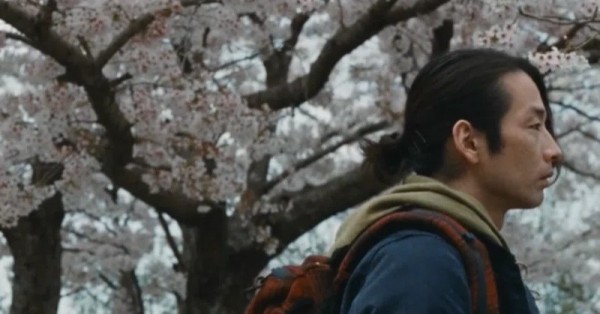 MIRAI MORIYAMA IN GREAT ABSENCEKEI CHICA-URA: GREAT ABSENCE (2023) JAPAN CUTS 2024Life of an estranged father with dementia explored like a detective storyGreat Absence
MIRAI MORIYAMA IN GREAT ABSENCEKEI CHICA-URA: GREAT ABSENCE (2023) JAPAN CUTS 2024Life of an estranged father with dementia explored like a detective storyGreat Absence is a study of dementia, based on the filmkaker's family experience, so deft it gets under your skin, till you thihk you're getting confused, don't know how things work, have fallen out of time. The film jumps around in time, as films do nowadays, but this time it underlines both the disconnect between a father and his estranged son and the father's own loss of connection. Takashi (Mirai Moriyama), is a Tokyo actor who visits his estranged father Yohji (Tatsuya Fuji, winner of a Best Actor award at Saint Sebastián for the role) across the country in a care home, coming with his wife producer Yuki (Yoko Maki), where Yohji, now paranoid and wildly fable-weaving, tells them crazy tales to explain what has become of his longtime love, Naomi.
But the film begins with police and excitement at Yohji's home, an alarm he has sent because he has lost his fix on the world. He cannot remember how to work a phone, or a cooker, or a fridge. His basic mental functions have declined so rapidly. And this scene makes the film feel like a detective thriller at first, a process continued as Takeshi and Yuki explore Yohji's disordered house, a jumble of lost objects and Post-its trying, uselessly, to help the older man find his way around a familiar world that has grown strange.
The film revisits two earlier moments. Part of the confusion comes from the fact that Takashi and Yohji have long been estranged, but once earlier Takashi visited his father when Naomi was there. Naomi (Hideko Hara), the woman for whom Yohji had left Takashi’s mother many years before is there then. But when the lost, confused Yohji summons the police, she is gone. Where has she gone? Yohji doesn't know, and may not quite remember who she is. At this earlier time, Takashi has recently enjoyed some success in a popular period TV drama, and Naomi reveals that Yohji gets excited for hours whenever this show is going to be on - one of several signs that they care more about each other than their lives have allowed them to acknowledge. Yohji left Takashi's mother for Naomi many years earlier. In the present, when Takashi explores his father's house, he finds a journal of Naomi's stuffed full of love letters from his father: he is discovering a world of feeling neither man shared, and now both are losing.
Takashi seems to have plenty of time, so he stays around exploring these documents and pondering his father's life - which his father in person now is useless as a source for: now that they can be together, there is no there there. This meandering allows the film to be dilatory, and reviews have to acknowledge that it goes on too long. But if the length doesn't work artistically, it certainly helps build our sense of the confusion of dementia. Yohji has long been a ham radio fan. A moment that sticks with me is the one where he comes back from buying a new microphone that he unwraps happily - only to find he already has one just like it. As Jessica Kiang says in her
Variety review, " despite being a little long, "in another way its multiple strands and many endings are extraordinarily, poetically appropriate" - because with dementia we are plagued by "a series of erratic goodbyes."
Mirai Moriyama as Takashi, with his sweep of long hair and long forelock hanging down like "William" in Season Two of the Norwegian series "Skam," makes a very watchable protagonist, but of course it is the old man this is most about, and in his different appearances, even brief ones, the prizewinning Tatsuya Fuji runs the gamut of all the ways dementia can manifest, and seek to hide, itself. This is a devastating and haunting film.
It's also a terribly relevant one, although, since Takashi is an actor in rehearsals for an avant-garde play, if reminds us this syndrome goes back as far as Shakespeare's
King Lear. Japan particularly has an aging population, and reportedly now has upwards of six million people with some form of dementia. It could happen to you; but just as bad, it could happen to someone close to you. The irony for Takashi and Yohji is that as they grow closer they are also growing further apart. The worst trick of memory is for memory to leave you. Screenplay by Kei Chika-Ura, Keita Kumano; director Kei also co-wrote and produced his sophomore feature. Cinematography by frequent Hirokazu Kore-eda collaborator Yutaka Yamazaki.
Great Absence 大いなる不在, 152 min., debuted at Toronto Sept. 10, 2023, showing also San Sebastián, where Tatsuya Fuji won best performance; plus Vienna, Israel, Göteborg. Screened for this review as part of the 2024 New York Japan Cuts series.





